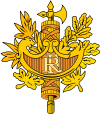- Denmark–France relations
-
Franco-Danish relations 

France
DenmarkDenmark–France relations refers to the current and historical relations between Denmark and France. Denmark has an embassy in Paris and France has an embassy in Copenhagen. Both countries are full members of NATO and of the European Union.[1][2]
Contents
History
The relations between Denmark and France date back to the middle ages, when there were French monks in Denmark, and Danish students in Paris. In the 17th century, there were many Danish students in medicine, law, philosophy and theology in France, while in Denmark there were many French tutors.[3]
Scanian War
Main article: Scanian WarThe Scanian War' was a part of the Northern Wars involving the union of Denmark-Norway, Brandenburg and Sweden. It was fought mainly on Scanian soil, in the former Danish provinces along the border with Sweden and in Northern Germany. While the latter battles are regarded a theater of the Scanian war in English, Danish and Swedish historiography, they are seen as a separate war in German historiography, called the Swedish-Brandenburgian War.
The war was prompted by the Swedish involvement in the Franco-Dutch War. Sweden had allied with France against several European countries. The United Provinces, under attack by France, sought support from Denmark-Norway. After some hesitation, King Christian V started the invasion of the Scania (Skåneland) in 1675, while the Swedish were occupied with a war against Brandenburg. The invasion of Scania was combined with a simultaneous Norwegian front called the Gyldenløve War, forcing the defending Swedes to fight a two-front war in addition to their entanglements in the Holy Roman Empire.
The Danish objective was to retrieve the Scanian lands that had been ceded to Sweden in the Treaty of Roskilde, after the Northern Wars. Although the Danish offensive was initially a great success, Swedish counter-offensives led by the 19-year-old Charles XI of Sweden nullified much of the gain.
It was a war with no definite victor; the Swedish navy lost at sea, the Danish army was defeated in Scania by the Swedes, who in turn were defeated in Northern Germany by the Brandenburgers. The war and the hostilities ended when Denmark's ally the United Provinces settled with Sweden's stronger ally France and the Swedish king Charles XI married Danish princess Ulrike Eleonora, sister of Christian V. Peace was made on behalf of France with the treaties of Fontainebleau and Lund and Saint Germain, restoring most of the lost territories to Sweden.[4]
War of the Sixth Coalition
Main article: War of the Sixth CoalitionIn the War of the Sixth Coalition (1812–1814), a coalition of Austria, Prussia, Russia, Spain, Sweden, the United Kingdom, and a number of German States finally defeated France and drove Napoleon Bonaparte into exile on Elba. After Napoleon's disastrous invasion of Russia, the continental powers joined Russia, Britain, Portugal and the rebels in Spain. With their armies reorganized along more Napoleonic lines, they drove Napoleon out of Germany in 1813 and invaded France in 1814, forcing Napoleon to abdicate and restoring the Bourbons.
Economic relations
French exports to Denmark were 2.19 billion euros in 2009. Imports from Denmark were 2.35 billion euros in 2009.[5]
See also
References
- ^ Danish Embassy in Paris(Danish)[(French)
- ^ French Embassy in Copenhagen (Danish)(French)
- ^ The German Influence in Danish Literature. pp. 211. http://books.google.dk/books?id=LGs3AAAAIAAJ&pg=PA6&dq=&hl=da&ei=4XMjTdewGsXtOce4oIEJ&sa=X&oi=book_result&ct=result&resnum=4&ved=0CEAQ6AEwAw#v=onepage&q=%22between%20Denmark%20and%20France%22&f=false. Retrieved 2011-01-04.
- ^ The Scanian War 1675-79. Educational site for high schools created by Oresundstid.
- ^ Economic relations
 Foreign relations of Denmark
Foreign relations of DenmarkAfrica 
Americas Asia Afghanistan · Bangladesh · Bhutan · Burma · Cambodia · China (PRC) · India · Indonesia · Iran · Iraq · Israel · Japan · Kazakhstan · Malaysia · Nepal · North Korea · Pakistan · Palestine · Philippines · South Korea · Sri Lanka · Syria · Taiwan · Thailand · United Arab Emirates · VietnamEurope Austria · Albania · Armenia · Azerbaijan · Belarus · Belgium · Bosnia and Herzegovina · Bulgaria · Croatia · Cyprus · Czech Republic · Estonia · Finland · France · Georgia · Germany · Greece · Hungary · Iceland · Ireland · Italy · Kosovo · Latvia · Lithuania · Macedonia · Moldova · Montenegro · Netherlands · Norway · Poland · Portugal · Romania · Russia · Serbia · Slovenia · Slovakia · Spain · Sweden · Switzerland · Turkey · Ukraine · United KingdomOceania Historical Missions  Foreign relations of France
Foreign relations of FranceAfrica Algeria · Angola · Chad · Republic of the Congo · Djibouti · Egypt · Gabon · Libya · Mali · Mauritania · Morocco · Niger · Senegal · Tunisia
Americas Argentina · Barbados · Brazil · Canada · Colombia · Haiti · Texas (historical) · Trinidad and Tobago · United States · Uruguay · VenezuelaAsia Middle EastElsewhereChina · India · Japan · Malaysia · Myanmar · North Korea · Pakistan · South Korea · Thailand · VietnamEurope Andorra · Armenia · Austria · Azerbaijan · Belarus · Belgium · Bulgaria · Croatia · Cyprus · Czech Republic · Denmark · Estonia · Finland · Georgia · Germany · Greece · Holy See · Hungary · Iceland · Ireland · Italy · Kosovo · Latvia · Lithuania · Malta · Moldova · Monaco · Montenegro · Norway · Poland · Romania · Russia · Serbia · Slovakia · Slovenia · Spain · Switzerland · Turkey · Ukraine · United KingdomOceania Missions Ministry of Foreign Affairs · Diplomatic missions of / in France · France and the Commonwealth of Nations · Foreign alliances of France · France and the United NationsCategories:- Bilateral relations of Denmark
- Bilateral relations of France
Wikimedia Foundation. 2010.
